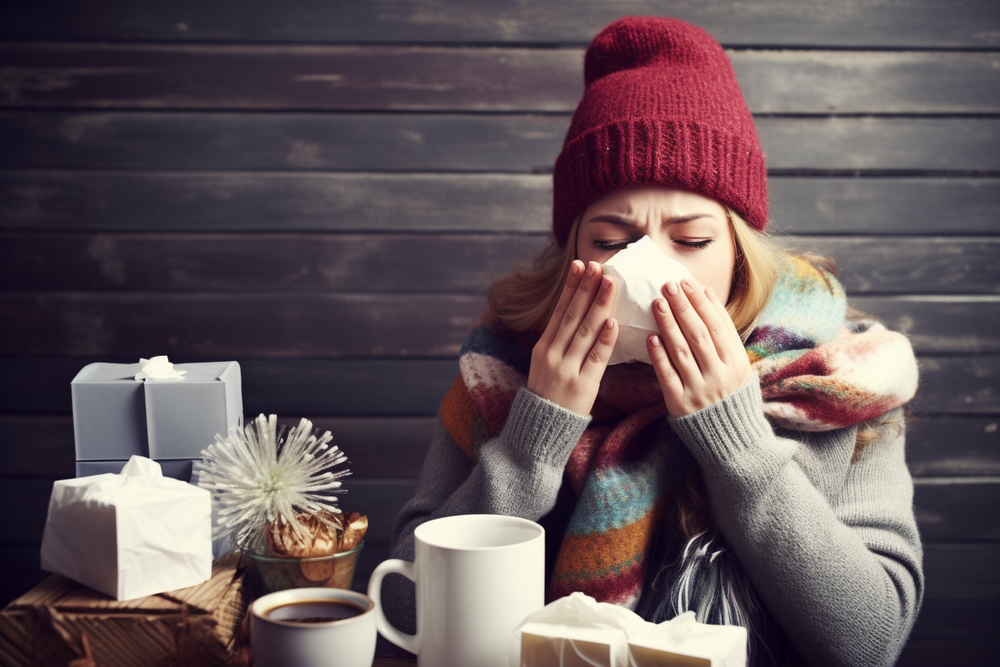You have no items in your shopping cart.

Colds and flu, also known as influenza, can be nasty illnesses that cause a lot of misery. It's important to understand what causes these illnesses so that you can protect yourself and your loved ones from getting sick.
In this article, I'll discuss the differences between colds and flu, how they are treated, and when it's best to see a doctor.
I'll also cover Meningococcal disease which is sometimes confused with colds or flu but is actually an entirely different illness. With this knowledge, you will have the tools to stay healthy during cold and flu season!
What causes a cold or flu?

The viruses that cause influenza (the flu) and the common cold are generally transmitted in one of two ways:
- Through the air: When an infected person sneezes or coughs, they expel tiny droplets containing the virus. If you are nearby and breathe in these droplets, you may become infected.
- Through contact: If the virus gets on a surface (like a doorknob or a tabletop), it can survive for some time. If you touch this surface and then touch your face, particularly your mouth or nose, you may become infected.
Once you have the virus, it begins to replicate in your respiratory system, which can cause symptoms like a runny nose, sore throat, coughing, body aches, and fever.
It's also worth noting that the flu is generally more severe than a cold and can sometimes lead to serious complications, such as pneumonia. Also, while there are many different viruses that can cause cold symptoms, the flu is specifically caused by influenza viruses.
How to prevent a cold or flu?
- Vaccinate: Get the annual flu shot to protect against the most common strains of influenza for that year.
- Hand Hygiene: Wash your hands often with soap and water, especially after being in public places, blowing your nose, or handling items touched by others.
- Avoid Close Contact: Avoid close contact with people who are sick. If you're around someone who is sneezing or coughing, try to keep a distance.
- Don't Touch Your Face: Avoid touching your eyes, nose, and mouth as much as possible. These are the areas through which cold and flu viruses often enter the body.
- Clean and Disinfect: Frequently clean and disinfect common surfaces and objects, such as doorknobs, light switches, or cell phones.
- Healthy Lifestyle: Maintain a healthy lifestyle by eating a nutritious diet, exercising regularly, getting adequate sleep, and managing stress. These all contribute to a healthier immune system, making it easier for your body to fight off illnesses.
- Avoid Large Crowds: During peak flu season, consider avoiding large crowds or gatherings where viruses might easily spread.
- Use a Tissue: Use a tissue, or your elbow, to cover your mouth and nose when you sneeze or cough to prevent spreading viruses.
How are colds and flu different?
Colds and flu, also known as influenza, share certain similarities but have distinct differences. Both are caused by viruses that can spread from person to person through transmission routes such as sneezing or contact with infected surfaces.
However, colds typically cause milder symptoms such as a runny nose and sore throat compared to the more severe symptoms associated with flu including fever, body aches, and fatigue.
Additionally, preventive measures like vaccinations are recommended for flu but not for colds since they don't provide significant protection against them.
Risk factors like age and weakened immune systems can increase your chances of getting either one so it's important to know how to distinguish between the two in order to take proper care of yourself.
Treating a cold

When feeling under the weather, it's important to know how to treat your symptoms properly in order to get back on your feet.
Cold and flu prevention is key - by avoiding risk factors such as contact with someone who's sick, not touching your face, and washing hands often, you can help prevent catching a cold.
If you do come down with a cold, there are some home remedies that can provide relief.
Here are some home remedies that may ease the symptoms of the common cold and flu:
1. Rest and hydrate: Your body needs energy to fight the virus. Staying in bed can provide the necessary energy. Good hydration helps break up congestion and is also essentially for your immune system. Drink water, juice, or broth, often.
2. Use a humidifier: Cold viruses thrive in dry conditions — another reason why colds are common in winter. Dry air can also dry out the mucous membranes in the nose and sinuses, which can leave them vulnerable to infection. A humidifier can add moisture to your home's air.
3. Soothe a sore throat: A saltwater gargle can temporarily relieve a sore or scratchy throat. Children younger than 6 years are unlikely to be able to gargle properly. You can also try ice chips, sore throat sprays, lozenges, or hard candy.
4. Treat aches and fever: Over-the-counter medications like acetaminophen (Tylenol, others), ibuprofen (Advil, Motrin IB, others), and aspirin can be helpful in relieving pain or lowering a fever.
5. Nasal irrigation: You might find that a nasal irrigation tool like a neti pot can rinse out your sinuses and help relieve your symptoms.
6. Hot liquids: Tea or warm apple juice can soothe a sore throat, help combat dehydration, and stimulate the movement of mucus.
7. Eat healthily: Immune-boosting foods include fruits rich in vitamin C, leafy greens, seeds, and yogurt that's high in probiotics. Light, easy-to-digest foods are best, as they won't consume too much energy for digestion.
Remember, if your symptoms persist and become severe, you should consult a healthcare professional.
Who should see a doctor?
If your cold symptoms persist or worsen over time, it's wise to consult a doctor for further advice. A physician can help you develop an effective symptom management plan and determine if any preventative measures should be taken. They can also provide insight into risk factors that may have contributed to the contraction of the cold and how long you are contagious. It's important to ask questions about nutrition tips as well; proper nourishment helps support a healthy immune system which is key for fighting off illnesses like the common cold.
Will antibiotics help me?

Antibiotics won't do you any good if you've caught a cold - they only work against bacterial infections, not viruses. To prevent the spread of colds and flu, it's important to practice good hygiene habits such as washing your hands often and avoiding contact with people who are sick. Taking over-the-counter medications to reduce symptoms can also help relieve discomfort. Some home remedies may provide additional relief from common cold symptoms as well. Getting an annual flu shot is also recommended to protect against influenza, although its effectiveness varies from year to year. Vaccines are considered safe and effective for most people; however, pregnant women should consult their doctor before getting a flu shot or any other vaccine.
What if I have the flu?
If you think you're suffering from the flu, seek medical help right away to get relief from your symptoms and reduce the risk of complications. Your doctor can provide guidance on how to manage your symptoms and prevent spreading the virus to other people. A healthy diet is also important for recovery - make sure you get plenty of fluids, fresh fruits, vegetables, lean proteins, and complex carbohydrates. Depending on the season, there may be more or less flu activity in your area; this can impact both prevention and treatment efforts. Finally, if appropriate for your condition, consider home remedies such as steam inhalation for congestion or tea with honey and lemon for a sore throat.
Treating the flu
Taking the right steps to treat the flu can help reduce its duration and severity, so don't delay in getting medical advice. The most important step is preventing infection by getting a seasonal vaccination. In addition to that, natural remedies such as herbs like echinacea and ginger may offer relief from symptoms like congestion, sore throat, and fever. Drinking plenty of fluids is also essential for hydration tips and reducing fatigue. Treating the flu quickly helps it go away faster so you can get back to feeling your best!
Meningococcal disease

Meningococcal disease is a serious bacterial infection that can cause life-threatening illnesses, so it's important to take preventative measures to protect yourself and your loved ones. Symptoms of meningococcal disease may include high fever, headache, stiff neck, confusion or sleepiness, and rash. Prevention strategies include getting vaccinated with the meningococcal vaccine, which is recommended for people aged 11 to 18 years old. Meningococcal disease is highly contagious and can be spread through close contact with an infected person via saliva or spit. Vaccination is the best way to avoid long-term effects of the infection, such as brain damage, hearing loss, kidney failure, limb amputation, and even death.
Frequently Asked Questions
How can I prevent a cold or flu?
I'm sure you've heard of colds and flu (influenza), and how these illnesses can have a huge impact on your everyday life. To prevent catching a cold or flu, it's important to be aware of the common causes, such as seasonal changes and contact with an infected person, as well as take preventative measures like washing your hands regularly and avoiding close contact with people who are displaying symptoms. Additionally, making sure you boost your immunity ahead of the flu season by eating nutritious foods and getting plenty of rest can help reduce your risk. If you do unfortunately catch a cold or the flu, there are many treatments available to help ease the discomfort.
What are the most common symptoms of a cold or flu?
When it comes to identifying the symptoms of a cold or flu, it can be helpful to know what to look out for. Common symptoms include fever, fatigue, headaches, muscle aches, congestion, and coughing. You may also experience a sore throat or sneezing. The best ways to prevent getting a cold or flu are by avoiding stress, boosting immunity through proper nutrition and exercise, drinking plenty of fluids when sick, and treating any fever right away. Knowing the common symptoms is an important part of staying healthy and taking the necessary steps to avoid getting sick.
What is the difference between a cold and the flu?
Cold and flu, both contagious illnesses, share many of the same symptoms. However, there are some key differences between the two. Cold viruses spread through direct contact with another person or object that's been touched by an infected individual. The risk factors for a cold include frequent hand washing and avoiding contact with people who've got colds. Flu, on the other hand, is caused by a different virus and can be more serious than a cold. It's spread through droplets in the air when an infected person sneezes, coughs or talks. People at higher risk of complications from flu include those with weakened immune systems and young children. Self-care tips for both illnesses are similar - rest and drink lots of fluids to help your body fight off infection. Taking steps to strengthen your immune system, such as eating healthy foods and exercising regularly, may also help reduce your risk of getting either a cold or flu.
Are there any home remedies for a cold or flu?
When feeling under the weather, it can be easy to turn to over-the-counter medications. However, there are a number of natural treatments that can help alleviate symptoms. Eating nutritious foods and avoiding processed options, getting plenty of restful sleep, and hydrating with water or herbal tea can all help boost immunity and reduce discomfort. Additionally, making sure air quality is good by opening windows or using an air filter may also provide relief. Taking the steps above may not completely cure a cold or flu, but they could help relieve some of the unpleasant effects during recovery.
How long can flu and cold viruses survive outside the body, on door handles and other surfaces?
Cold and flu viruses can live on hard surfaces such as plastic and stainless steel for about 24-72 hours. However, they become much less potent over time, and by 24 hours, only a small fraction can still cause disease. On porous materials like clothing, paper, and tissue, the viruses typically live for less than 8-12 hours.
Is there a vaccine for the flu?
Yes, there's a vaccine for the flu. Taking precautions against the virus is key to preventing infection. Receiving an annual flu shot greatly reduces your risk of getting the flu. The vaccine protects against three or four different types of influenza viruses. It's especially important for those at high risk of complications from the virus. Healthy habits, such as frequent hand washing, avoiding contact with sick people, and eating nutritious foods, can also help protect you from contracting the virus. If you do get sick with the flu, natural treatments such as drinking plenty of fluids and getting rest may help alleviate symptoms.
Conclusion
No matter what your symptoms are, it's important to take care of yourself and get the right treatments for colds and flu. If you have severe symptoms or can't seem to shake a cold or flu after several days, it may be time to see a doctor. Antibiotics won't help with viruses like influenza, but antiviral medications can help reduce the severity and duration of the illness. For more serious diseases like meningococcal disease, seek medical attention immediately as it can be life-threatening. By taking care of yourself when you're sick, you can help prevent spreading illnesses to others.

This information is intended solely for New Zealand residents and is of a general nature only. No person should act in reliance on any statement contained in the information provided, but at all times should obtain specific advice from a health professional.
